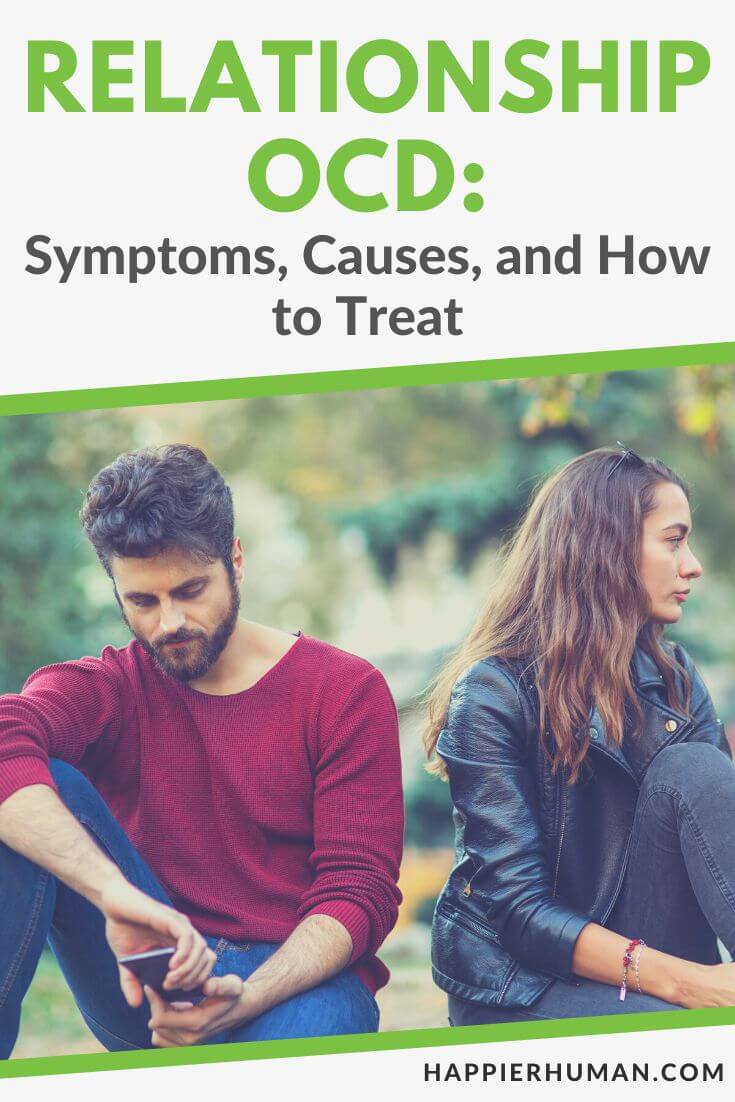OCD is an anxiety disorder that affects roughly 1.2% of the world’s population.
Characterized by intrusive thoughts and compulsive behaviors, this condition can interfere with your daily life and relationship.
The intrusive thoughts that people with OCD experience can gravitate around irrational fears and chronic doubts, leading to a series of repetitive, reassurance-seeking behaviors known as compulsions.
Relationship OCD (or R-OCD) is a subtype of obsessive-compulsive disorder in which obsessions and compulsions revolve around your romantic relationship.
As you can imagine, all the fears and doubts, which fuel excessive reassurance-seeking, can put a lot of stress on the relationship and even make it difficult for people with OCD to find a romantic partner.
So, what exactly is relationship OCD? Is it any different from other forms of obsessive-compulsive disorder? And most importantly, what can we do about it?
Let’s Start with Obsessive-Compulsive Disorder
In essence, obsessive-compulsive disorder is a chronic mental condition in which the person has specific uncontrollable and unwanted thoughts, ideas, images, or fears (obsessions) which generate a lot of stress and anxiety.
To calm these intense emotions, people with OCD engage in endless, repeated behaviors that can last for hours, interfering with their daily lives and causing great distress.
For instance, imagine you experience intense fear every time you touch a doorknob, and the only way to calm down is to wash your hands or disinfect the doorknobs in your house or office regularly.
Although most people with OCD realize that their obsessions and compulsive behaviors don’t make sense and are excessive, they feel unable to control them without resorting to certain compulsive behaviors.
What Are the Symptoms of OCD?
Long story short, OCD is a serious mental health condition that can have devastating effects on your personal life and relationship.
OCD vs R-OCD: What’s the Difference?
Although R-OCD is a lesser-known condition than OCD among the general population, mental health professionals often use it to describe patients whose obsessions and compulsions manifest solely in relation to their relationship and romantic partners.
In fact, researchers have only recently begun to explore the symptoms and phenomenology of this specific type of OCD and propose possible treatment options. [1]

Some experts argue that the obsessive doubts that characterize R-OCD can be relationship-centered or partner-focused. [2]
While people with partner-focused OCD are preoccupied with their partner’s intelligence, character, or personality and whether they are a good fit or not, people with relationship-centered OCD are constantly worried their partner will leave them or the relationship will somehow fail.
As you can probably imagine, living with a partner who struggles with OCD isn’t easy, especially when their condition raises constant doubts and reassurance-seeking behaviors. On top of that, OCD is often associated with depression, making it challenging to maintain a happy relationship.
Long story short, the only notable difference between OCD and R-OCD is the nature of obsessive thoughts.
In other words, people with R-OCD manifest excessive doubts and worries related exclusively to their relationship or romantic partner.
What are the Symptoms of Relationship OCD?
1. You need constant reassurance
Reassurance-seeking is one of the most common signs of R-OCD.
When you’re struggling with this condition, you often consult with others (close friends or family members) about your relationship.
You are terrified by the idea that the relationship will fail one way or another.
And the worst part is that no matter how much you discuss this concern with your significant other, you still can’t shake off the overwhelming anxiety that accompanies your obsessive thoughts.
2. You’re always looking for proof of love (or trouble)
When dealing with R-OCD, you’re like an emotional detective constantly searching for proof that your significant other is still in love with you. Or that they’re cheating.
Any shift in their mood throws you into a spiral of doubt and worry, triggering compulsive behaviors.
Any text that goes unanswered is a sign of trouble, a clue which leads you to believe the relationship is at risk.
Or maybe you keep testing their love and loyalty.
Unfortunately, this constant need for proof of love generates stress for both partners and can damage the relationship.
3. You keep making comparisons
People with R-OCD tend to make comparisons quite often.
They look at other people’s relationships (usually close friends or coworkers), trying to pinpoint aspects they believe are missing from their relationship.
It’s almost as if they’re trying to build the ‘ideal’ relationship using bits from what they perceive as the perfect ingredients for a successful couple.
Once again, this obsession can eventually drive your significant other away.
4. You worry about whether your partner is a good match
You want to know if they are a perfect match, so you resort to online quizzes, astrology readings, anything that will clear your doubts and give you a sense of certainty.
Don’t get me wrong; there’s nothing wrong with completing an online quiz or getting an astrology reading, as long as you remain reasonably sceptical and don’t take those conclusions as infallible truths.
However, when you’re having ‘chronic’ doubts about your relationship and keep checking your compatibility through all sorts of means, you might be dealing with R-OCD.
5. You can’t get over your partner’s flaws
Some need constant proof of love, while others cherry-pick their partner’s flaws.
However, both behaviors have the same root – a chronic sense of doubt accompanied by stress and anxiety.
The compulsive need to find your partner’s flaws may arise when you’re constantly obsessed with the idea that you’re not a compatible couple.
6. You obsess over your partner’s well-being
When you’re constantly worried that the relationship will fail, the mind tends to devise scenarios in which this fear becomes a reality.

For instance, you get obsessed with the idea that your significant other might get sick or suffer an accident.
As a result, you focus excessively on their health and well-being to the point where you want to control every aspect of their lifestyle.
7. Your mind is overwhelmed with “what ifs”
Given that OCD is an anxiety disorder, there are a lot of ‘what ifs’ that are constantly running through your head.
What if we’re not a good match?
What if I lose them?
What if they are not the right one?
We all have doubts, and that’s perfectly normal when you’re emotionally invested in a relationship.
But when these doubts and worries occur repeatedly and uncontrollably, chances are you might be dealing with R-OCD.
What are the Causes of Relationship OCD?
Like many other emotional and mental health problems, OCD results from a mix of genetic [3] and environmental [4] factors.
For instance, changes in specific genes which regulate serotonin and dopamine can increase the risk of OCD.
As for environmental factors, stressful life events and traumatic experiences can trigger the onset of obsessive-compulsive disorder. [5]
Since the obsessions and compulsions specific to R-OCD gravitate around your life partner or relationship, certain factors can explain why you’re dealing with chronic doubts about your relational future.
In other words, we need to look at stressful events which are somehow linked to the person’s relational history.
For example:
Long story short, we all tend to experience a certain level of anxiety when we choose to invest emotionally in someone.
But for people with R-OCD, anxiety reaches severe and debilitating levels.
How to Cope with Relationship OCD
Open Communication
People who struggle with OCD or R-OCD are well-aware that their obsessive doubts and worries are exaggerated and problematic.
They often feel ashamed for their excessive reassurance-seeking or constant doubts about the person who has repeatedly shown them love and appreciation.
If you’re dealing with R-OCD, the person who can help you overcome this condition is your significant other.
The first step is to establish open and honest communication with your partner.
Share your doubts, worries, and anxieties with them so they can have a better sense of what you’re dealing with.
Help them understand why you keep stressing over certain reassurance-seeking behaviors and let them know how you feel when something they say or do triggers your obsessive worrying.
At the same time, lend an empathetic ear and encourage them to share their feelings.
You might not like hearing how certain things you obsess over affect your significant other, but it’s vital to refrain from making excuses or justifying yourself.
Simply listen and give voice to your concerns.
Team effort
Dealing with R-OCD requires a team effort.
Since both partners are affected by this condition, you must tackle this issue together and cultivate well-being as a couple.
In my experience, many of the partners of people with OCD want to be more involved but don’t know how to do it.
Some don’t fully understand what it’s like to struggle with OCD; others have reached a point where their patience has run thin.
In either case, a mental health professional or a support group can provide the much-needed safe space for relevant discussions about the symptoms and challenges of OCD.
But until you turn to one of these resources, the simplest thing you can do as a couple is share and listen.
The more you understand each other’s struggles, the more trust and support you cultivate within the relationship.
Support groups
Support groups can be a valuable resource for people with R-OCD and their significant other.
If you’re dealing with R-OCD, a support group is a safe space where you can talk about your struggles with people who know exactly what it’s like to deal with this problem.

It’s also a good reminder that you’re not the only one struggling with this condition, and that sense of belonging will give you the strength and emotional support to overcome OCD.
If you’re in a relationship with someone who struggles with R-OCD, joining a support group (live or online) can help you get a better sense of what your life partner is dealing with.
On top of that, you can ‘unburden your soul’ and share some of the difficulties you experience living with someone dealing with OCD.
Sharing your burdens with people who can and want to be there for you can take some pressure off the relationship, giving you both the strength to heal and thrive as a couple.
Couples therapy
OCD (in all its forms) is a severe mental health condition, and people who struggle with this type of anxiety disorder can benefit greatly from professional help.
For instance, couple-based cognitive-behavior therapy is a promising approach that helps patients achieve substantial improvements and provides much-needed support for their partners. [6]
More specifically, therapy can assist R-OCD sufferers and their partners by:
The most effective way to address this issue is by consulting a mental health professional.
Not just for couples therapy but for individual sessions as well.
Final Thoughts on Relationship OCD
R-OCD is a condition that affects not only the person dealing with it but also their life partner.
The obsessive worrying and compulsive reassurance-seeking people with R-OCD struggle with puts a lot of stress on the relationship.
In time, the constant stress that the two partners face can give rise to conflicts, eventually leading to breakups, separation or divorce.
The keys to overcoming R-OCD and preventing it from destroying your relationship are:
The more open and eager the partners are to understand and support each other, the more likely they are to overcome R-OCD.

Alexander Draghici is a licensed Clinical Psychologist, CBT practitioner, and content writer for various mental health websites. His work focuses mainly on strategies designed to help people manage and prevent two of the most common emotional problems – anxiety and depression.
References
| [1] | G. Doron, D. S. Derby and O. Szepsenwol, “Relationship obsessive compulsive disorder (ROCD): A conceptual framework,” Journal of Obsessive-Compulsive and Related Disorders, vol. 3, no. 2, pp. 169-180, 2014. |
| [2] | O. Szepsenwol, B. Shahar and G. Doron, “Letting it linger: Exploring the longitudinal effects of relationship-related obsessive-compulsive phenomena,” Journal of Obsessive-Compulsive and Related Disorders, vol. 11, pp. 101-104, 2016. |
| [3] | D. L. Pauls, A. Abramovitch, S. L. Rauch and D. A. Geller, “Obsessive–compulsive disorder: an integrative genetic and neurobiological perspective,” Nature Reviews Neuroscience, vol. 15, p. 410–424, 2014. |
| [4] | D. C. Cath, D. S. van Grootheest, G. Willemsen, P. van Oppen and D. I. Boomsma, “Environmental Factors in Obsessive-Compulsive Behavior: Evidence from Discordant and Concordant Monozygotic Twins,” Behavior Genetics, vol. 38, p. 108–120, 2008. |
| [5] | K. Murayama, T. Nakao, A. Ohno, S. Tsuruta, H. Tomiyama, S. Hasuzawa, T. Mizobe, K. Kato and S. Kanba, “Impacts of Stressful Life Events and Traumatic Experiences on Onset of Obsessive-Compulsive Disorder,” Frontiers in Psychiatry, 2020. |
| [6] | J. S. Abramowitz, D. H. Baucom, S. Boeding, M. G. Wheaton, N. D. Pukay-Martin, L. E. Fabricant, C. Paprocki and M. S. Fischer, “Treating Obsessive-Compulsive Disorder in Intimate Relationships: A Pilot Study of Couple-Based Cognitive-Behavior Therapy,” Behavior Therapy, vol. 44, no. 3, pp. 395-407, 2013. |


